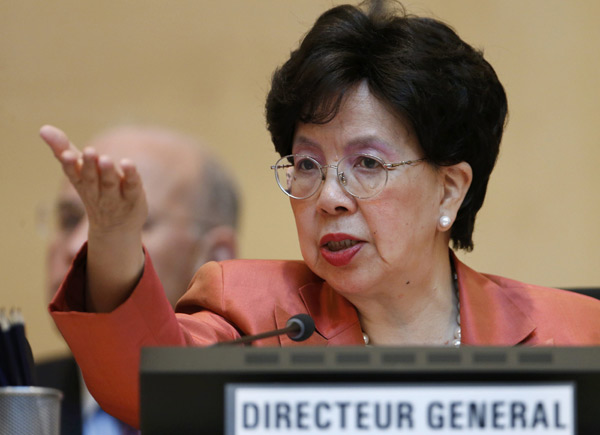 |
|
World Health Organisation Director-General Margaret Chan attends the 69th World Health Assembly at the United Nations European headquarters in Geneva, Switzerland, May 23, 2016. [Photo/Agencies] |
GENEVA - World Health Organization (WHO) Director General Margaret Chan outlined Monday the challenges faced by the global community in light of current health issues while stressing the importance of meeting targets set by the UN Sustainable Development Goals agenda.
"The profile of health changed from a drain on resources to an investment that builds stable, prosperous and equitable societies," she said in her address to the 69th World Health Assembly (WHA) held in Geneva.
"Health holds a prominent and central place that benefits the entire agenda. It aims to do nothing less than transform the way the world, and the international systems that govern it, work," she added.
Against the backdrop of past achievements, Chan said that more needs to be done to address myriad health scourges still affecting global communities in an increasingly interconnected world.
"Very few health threats are local anymore. And few health threats can be managed by the health sector acting alone," she said.
Drawing parallels with the Ebola crisis which resulted in over 11,000 deaths in West Africa, Chan cautioned that Zika is also testing concerted efforts to abate the spread of the mosquito-borne virus.
"For Zika, we are again taken by surprise, with no vaccines and no reliable and widely available diagnostics tests. To protect women of childbearing age, all we can offer is advice," she said.
The propagation of yellow fever, for which a vaccine has existed since 1937, is also revealing shortcomings in the global health sector's ability to protect those living in endemic countries.
"Let me give you a stern warning. What we are seeing now looks more and more like a dramatic resurgence of the threat from emerging and re-emerging infectious diseases. The world is not prepared to cope," Chan said.
Despite topical health imperatives, she reminded that a number of issues that tarnished the health outlook for countries at the start of the century have been successfully dealt with by sound public health policies.
Figures show that 19,000 fewer children are dying every day and that there has been a 44 percent drop in maternal mortality. A total of 85 percent of tuberculosis cases are now successfully cured, while more than 15 million people living with HIV have access to antiretroviral therapy, compared to just 690,000 in 2000.
The campaign to end polio is also showing promising results, with Africa free of wild poliovirus for close to two years.
"We have entered an ambitious new era for health development. We have a solid foundation of success to build on," Chan said.
The WHA, WHO's main decision-making body, will set policies on a broad range of high-priority health issues, from maternal and child nutrition, universal health coverage to health emergencies.
Convened annually and ending on May 28, this year's meeting is the biggest to date, bringing together some 3,500 people.
Some 21 resolutions are expected to be discussed by delegations from WHO's 194 members.